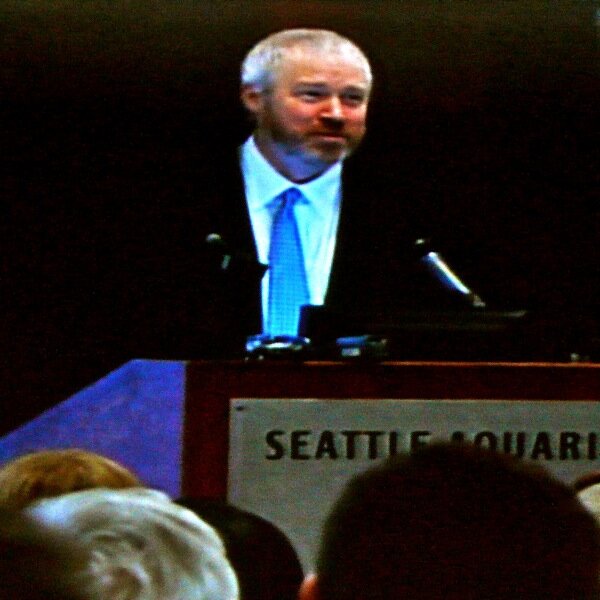How much do we dislike the job Mayor McGinn’s doing? A new Elway poll (which they commissioned themselves) claims to show that two-thirds of Seattle voters view his performance negatively.
Of course, that depends upon what your definition of “negative” is. Only 27 percent of voters flat-out called his performance “poor.” The largest group, 39 percent, said it was “only fair.”
That sounds like a gentleman’s C, to me, and not to be unexpected from someone who is a) new to working within city government, b) taking up controversial positions, c) an outstandingly impolitic speaker, and d) in the unlucky position of cutting spending everywhere. (Just for the record, I’d give McGinn a C myself; though I sympathize with his positions on many issues, his ability to work the Seattle process out of stalemate is very much in doubt. So far, as a coalition-builder he’s failed, and he too often takes his eye off the daily government ball to fasten onto hot-topic issues.)
In that context, his 24 percent “good” rating (four percent said “excellent”) is almost jaw-dropping. As Publicola notes, for the same time in his first term, Greg Nickels had a 57 percent “fair” to “poor” rating, so if you tack on a ten-percent recessionary handicap, McGinn is right there in the ballpark of dashed initial expectations. (Also, polls are fickle creatures: Back in July 2010, McGinn had a 45 percent approval rating, while Governor Gregoire endured the shameful stigma of a two-thirds disapproval rating.)
It’s worth remembering that polls of this nature are reflections largely of how a politician is reported on in the media. Most of us are not spending our days at City Hall, peering over the Mayor’s shoulder, clucking and tsking over the minutiae of his decision-making. We are making judgments based on hearsay, or because the roads are in terrible condition, or because we are in favor of building the tunnel.
In the Seattle Times, whose editorial pages have spent a good deal of time running down the Mayor (no mention of that as a contributing factor, but perhaps it’s true that no one cares what the Seattle Times editorial writers think), the story leads with Bob Watt’s fair-enough assessment that McGinn’s aggressive lawerly instincts have been doing him more harm than good. Watt, though, was deputy to former Mayor Norm Rice, who is more remembered for his nickname “Mayor Nice” than any single accomplishment.
Whereas Nickels’ deputy mayor, Tim Ceis, told the Times: “Mike’s a smart guy, a resilient guy. We shouldn’t write him off yet. He’s got a long ways to go.” Ceis notes that it’s fairly easy to fix negative poll numbers: the Nickels administration did it by fixing potholes and putting down new sidewalks.
I said above that McGinn has so far failed at coalition-building. I’d emphasize that because in another Elway poll, on the Viaduct replacement project, some 55 percent of voters agreed that the public should have a chance to weigh in on the deep-bore tunnel option. Yet the City Council has consistently voted 8-1 to proceed with the tunnel and to avoid any further public vote. McGinn can’t get Nick Licata on his side because even Licata won’t go out on that limb without some kind of state legislative support for a Plan B.
(And now City Attorney Pete Holmes is suing to prevent an anti-tunnel referendum from reaching the ballot in November, arguing that the referendum illegally obstructs an administrative action.)
As Gerald Jampolsky once said, speaking of the human tendency to fasten onto ideological correctness, rather than find social consensus, “You can be right, or you can be happy.” In McGinn’s poll, we see the corollary–McGinn may be right, but most everyone else is unhappy. McGinn and his favored Plan B, the I-5/surface/transit option, suffer from the same negatives: They’re both easily caricatured as anti-car do-nothings.
The I-5/surface/transit solution adds a new lane to I-5 northbound, for instance. That alone would increase north-south capacity by 30,000 vehicles daily, very nearly as much as the tolled tunnel is expected to carry. That’s not mentioning the 6-lane boulevard, or the added, funded transit, or the improvements for freight mobility.
Now, here is how MyNorthwest’s web poll boils down the I-5/surface/transit option: “Stick with surface streets.” (This is an actual news source, though I am tempted to give that scare quotes.)
If you can’t trust the usual media sources to fairly represent you or your projects, then coalition-building has to be your highest priority. Otherwise, you are the crazy person on TV.
You’ve seen it in almost every Western movie, that moment where the embattled sheriff stands alone, but then at the last minute people step forward. Well, that movie is lying to you–most lone-wolf sheriffs get shot in the back. People only step forward because there have been one hundred, one thousand, one hundred thousand, back-channel conversations.
Minds are changed not because any one person is right, but because different people take up the cause, often for different reasons, and they don’t let it drop. That is happening here in Seattle–the disconnect between the populace and our representation on the City Council may be leading to work-arounds of dubious efficacy, but come election time the Council may find that their approval ratings have come home to roost.
